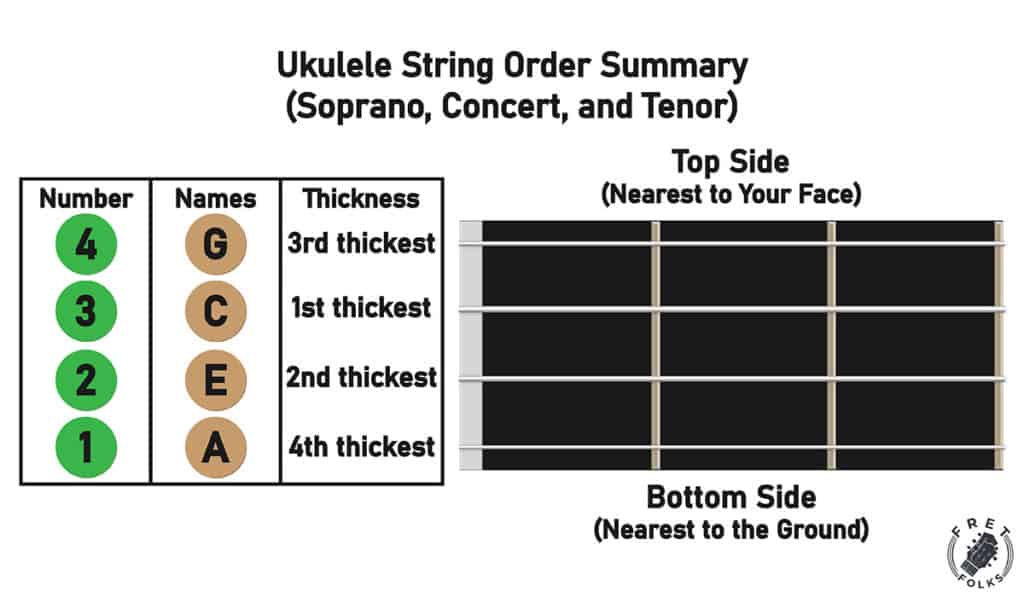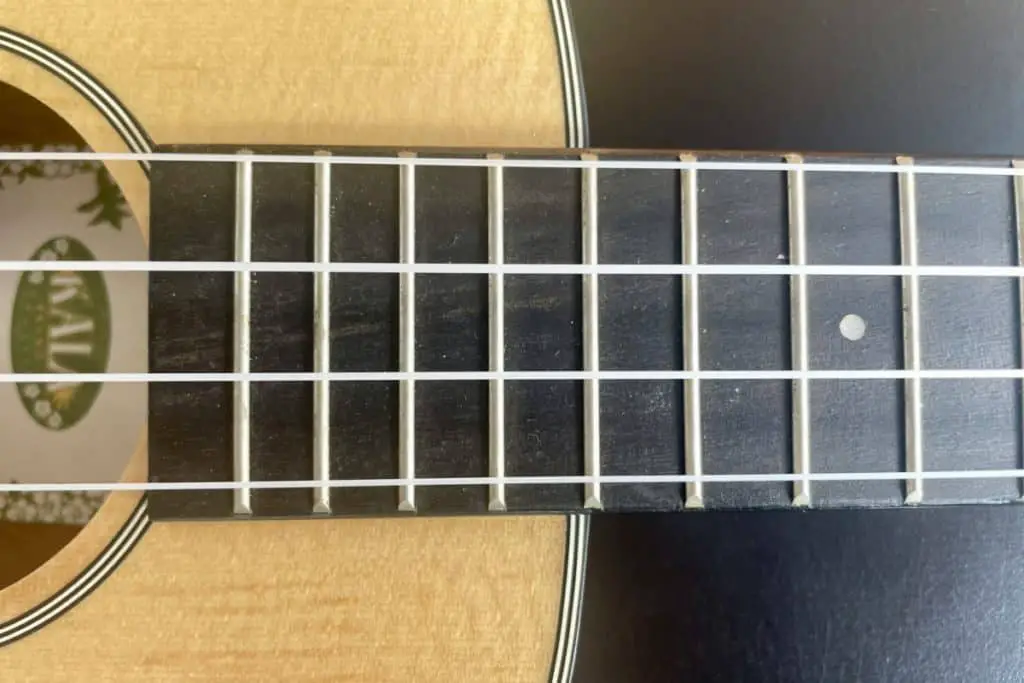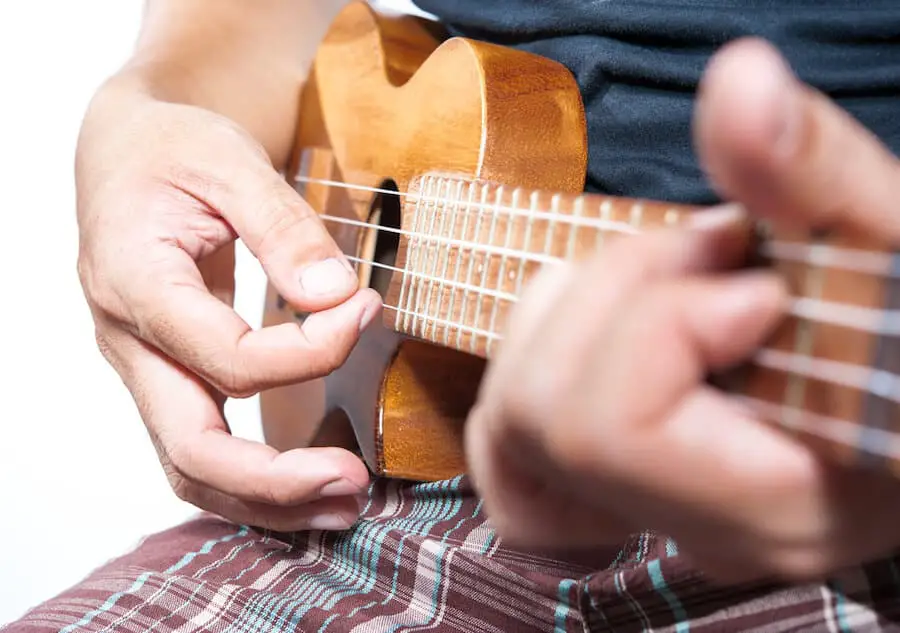Today I’m going to explain some common reasons your ukulele might sound weird along with fixes that will hopefully correct the problems.
I’ve played many different ukuleles and I can tell you some sound better than others no matter what. But a few seemingly minor things can cause your instrument to sound majorly off – even if you just tuned it! Luckily, most of these issues are pretty easy to fix.
Let’s start with a quick summary.
If your ukulele sounds weird after tuning, it could be due to poor playing technique, temperature or humidity changes, playing outside, heavy strumming, improper setup, or long fingernails. New, old, or unsuitable strings also impact sound. If it’s a cheaper ukulele, intonation issues or bad tuners could be to blame.
Now, let’s dive right into getting your ukulele sounding its best!
Reason 1: Incorrect Tuning
Tuning can be a challenge and sometimes it’s easy to end up in the wrong octave or tuned to the wrong notes altogether. To make matters worse, most ukuleles use reentrant tuning – in which octaves are mixed – which makes it even more confusing.
Fix:
Double-check every single string using an electronic tuner to ensure it is tuned to the correct note. The tuning should be gCEA, starting with the string closest to your head while you play.

The g string should sound higher in pitch than the C and E strings. Otherwise, it won’t have that classic ukulele sound!
Note: There are other ukulele tunings out there. If you are tuning to one of those, make sure each string matches the pitch and octave you are going for!
Reason 2: Poor Playing Technique
Learning to play the ukulele involves a lot of moving parts and it’s easy to pick up bad habits while you’re focusing on everything else. Slouching, holding the ukulele at an upward-facing angle to better see your fingers, and fretting notes incorrectly can all cause your uke to sound wonky.
Fix:
Avoid slouching while you play – make sure you are holding your shoulders back and not hunching over the uke.
As hard as it may be, don’t angle your ukulele towards the ceiling while you play – both of these moves restrict your strumming motion which can change the sound for the worse.
Also, make sure you are fretting notes correctly and not contacting the metal fret wire. Push down on the string just hard enough to sound the note – pushing too hard or not hard enough can both impact the sound and can cause buzzing.
Reason 3: Changes in Temperature or Humidity
Most ukuleles are made out of wood, which is very sensitive to environmental changes. Wood expands and contracts in response to moisture levels and temperature. This is perfectly normal but it is something to be aware of.
Fix:
Give your uke some time to adjust to a new environment before you tune it. If you take it from a climate-controlled house to a beach, it will likely need a re-tuning – even if you just tuned it!
Reason 4: Playing Outside
Even if you took your ukulele outside, let it adjust, then tuned it, there’s still a chance it will sound different than usual. This often has less to do with your ukulele and more to do with surrounding objects – or lack thereof.
If you’re out in the open – say, on a beach – your uke might sound thinner and smaller-voiced than normal. This is because there are no surrounding objects, like walls, to bounce the sound back at you.
Fix:
The best way to correct this problem is to change your location. Move to a more enclosed space like a patio and the sound should improve.
Reason 5: New Strings
A newly strung ukulele will commonly sound off for a little while until the strings bed in. New strings are constantly stretching and going out of tune and can sound bad as early as minutes after you tuned up.
Fix:
Tune and play frequently – then repeat! This process takes time, but there are some tips to speed it up. Check out our article on how long it takes to break in ukulele strings for more information on this.
Reason 6: Old Strings

Old strings can also make your ukulele sound dead or flat. If you’re noticing a decline in your uke’s sound and can’t remember when you last changed the strings, old strings could be the culprit.
Fix:
Change out your strings! Once you’ve gone through the break-in period all new ukulele strings require, you should notice an improvement in tone and response.
Reason 7: Strings That Don’t Suit Your Uke
Not only do ukuleles come in all shapes and sizes, but they are made of many different materials as well. Ukulele strings are also made out of several different materials and sometimes they can clash with your ukulele.
Fix:
It’s easier to swap your strings out than get a new ukulele (unless, of course, you need a good excuse to do that). Shop around for a different type of string – if you had Nylguts before, grab some fluorocarbons this time.
Consider what type of uke you have, too – some matches work better than others, although it’s really up to you what sounds best! Read our guide on what ukulele strings are made of to help you decide which kind to try.
Reason 8: Bad Tuners
Another common culprit for a weird-sounding uke is it’s tuners. If your tuners are bad – meaning they slip or otherwise don’t hold the string tightly – your instrument will never sound good no matter how much you tune it.
Fix:
Unfortunately, this fix is a little more involved. If you love your ukulele, consider taking it to a luthier and having the tuning pegs replaced with a better-quality set. You can also attempt this yourself if you’re mechanically inclined.
If you don’t think your uke is worth the trouble, it might be time to go shopping for a new one.
Reason 9: Heavy Playing

If you strum vigorously, do a lot of bends, or just play a lot in general, your uke may drift slightly out of tune throughout a playing session, even if you tuned up at the start.
Fix:
Adjust your playing style by strumming and bending more delicately. Or, just take some breaks during your session to re-tune. After all, even the pros have to tune up during concerts!
Reason 10: Long Fingernails
While long fingernails can be a great thing on your strumming hand, you never want long nails on your fretting hand.
Even if they are just a little too long, they can keep your fingers from cleanly contacting the string, resulting in buzzing and off notes.
Fix:
Keep your fretting hand fingernails as short as possible by trimming or filing to ensure quality fretting abilities.
Reason 11: A Poorly Set Up or Damaged Ukulele
Even the best ukulele on the market will not sound good if it hasn’t been set up properly. Poorly set up ukes often have intonation issues, in which the strings are tuned but still don’t sound quite right.
Intonation is impacted by how the parts of the ukulele fit together – things like neck angle and bridge placement.
Fix:
Take your ukulele to a luthier for a proper setup or at least an exam. This will either correct the issue or identify a more serious problem – like a warped neck – that will mean it’s time for a new instrument.
Reason 12: A Cheap Ukulele
There are many ukuleles on the market these days and sadly not all of them are winners. An inexpensive, poorly made ukulele often produces sounds that could be described as bad or weird no matter what you do.
These instruments are often mass-produced as cheaply as possible, meaning frets may be too high, which causes buzzing, and they may be set up poorly which can cause intonation issues. Without intervention, such a uke probably won’t ever sound good.
Cheaper ukes are also typically built using laminate construction, in which three pieces of wood are glued together.
Laminate ukes can lack the tonal nuances of higher-end instruments and tend to sound muddy or dead. It’s possible you have a discerning ear and can hear the lack of quality in the build.
Fix:
Take your ukulele to a luthier for a proper setup. You would be surprised at how much this does to improve the sound in some cases!
You can also try a different set of strings to see if they jive better with your uke.
Or, you can use this as an excuse to level up to a higher-quality instrument. There are many decently constructed, reasonably priced ukuleles out there!